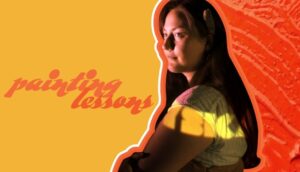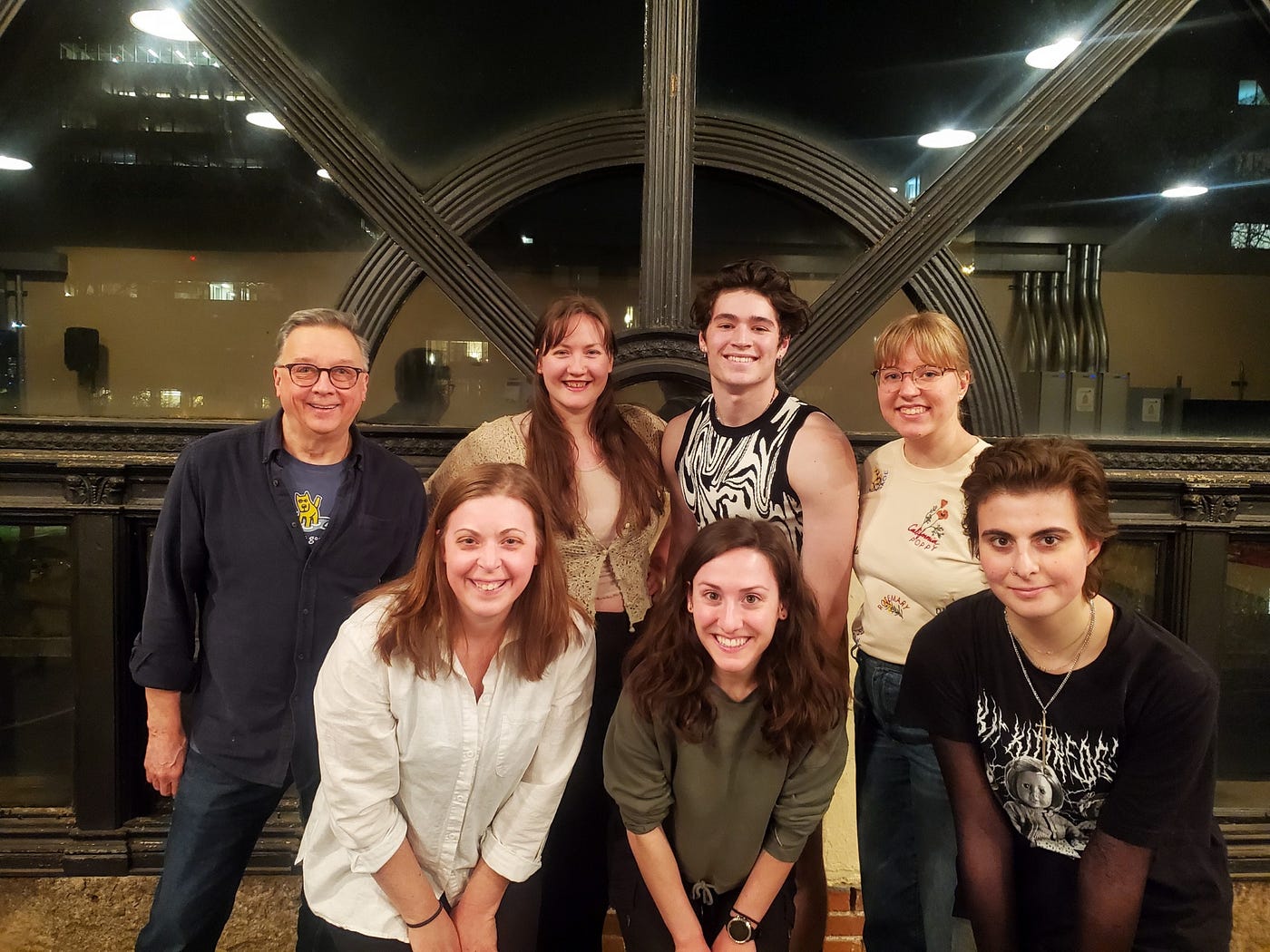PREVIEW: Jasmine Roth’s Painting Lessons

Jasmine Roth’s play Painting Lessons Stops Time to Explore the Surreality of Grief
By Vanessa Reseland
Photos be Renee Rosensteel
Continuing Recital’s sponsored partnership with the New Hazlett Theater, we are presenting a series of editorially-independent previews and reviews of the 2022–23 Community Supported Art (CSA) Performance Series.
In the wake of her Father’s passing, multi-talented theatre artist, Jasmine Roth, began writing. She wrote as a tool for healing. She explored what would happen if one could stop time and bring a loved one back to fulfill plans made in life. What if the fantasy of having more time together became available in an alternate reality? Eventually, the piece she wrote grew into a play accepted by the New Hazlett Theater CSA series. Roth directs, and it is to be performed on March 23 and 24, 2023, and I got to sit with Roth to discuss her piece, Painting Lessons.
Painting Lessons has three showings, Thursday, March 23 at 8 PM and Friday, March 24 at 11 AM & 8 PM. Tickets range from $20–$30 and are available at https://newhazletttheater.org/events/painting-lessons/.
This interview has been edited for clarity and length.
Vanessa Reseland: Could you tell me a little bit about the storyline and style of your play, Painting Lessons?
Jasmine Roth: The character J learns that her Dad is dying and creates this metaphysical cactus garden between time and space where she can have all the conversations that she wishes she could have with him while he’s still healthy, while he was still alive. It’s a bit of a fantasy of everyone who’s lost somebody that they love, or somebody that they’ve had a complicated relationship with and haven’t gotten to have all the closure or healing. It’s a bit of the fantasy of what that could be like.
VR: Who’s to say a fantasy world would be less real than whatever else is going on while we’re grieving?
JR: I think my goal, in a sense, was to capture that surreal, bizarre thing that is death, that doesn’t follow the rules of life as we know it. So the play doesn’t follow the rules of life, physically. I think it follows at least my experience of what death is and what it feels like when you’re going through it. Time moves fast and slow at the same time. Somebody feels like they’re crashing between planes of existence, this bizarre emotional experience that’s not really captured by the physical day-to-day in a logical sense. [Painting Lessons] is pretty dreamy. It’s a bit non-linear. We are stopping time and then speeding up time at points. Movement was important to take us into the body and the body’s experience of the journey the characters are on. It does have some traditional play structure, but it also kind of ebbs and flows into a more surreal space at times.
VR: I have an interpretation of what a metaphysical cactus garden means to me that is very clear, but what does a metaphysical cactus garden mean to you?
JR: What I love is that every time I say, “metaphysical cactus garden,” people go, “Oh, yeah, yeah, yeah, I know what that is,” which is really interesting. People do have an immediate image that’s conjured! For me, when I lost my Dad, I was living in Arizona, so I was sort of living in a cactus garden, and he was on the other side of the world, literally, in Australia. We had talked many times before he got sick about him coming to Arizona and staying with me, and doing an artist-in-residency in the desert. He wanted to do a whole series painting the Arizona desert, which is so lush and so unique and beautiful. We had this dream together.
So, naturally, the birth of this play was, “Ok, what if I got to stop time, and we could have that?” So it certainly is grounded in reality in that way and also on this ethereal plane. Of course, it’s a play, so there’s conflict, and we can’t stay there. And, of course, in life, I couldn’t stay in the fantasy either. You do have to get up the next day and survive and eat food and go to work and all the things that you have to do to live life. One of the conflicts of the play is that it would be so juicy and wonderful to just stay in that beautiful place and just paint, but just on the outside of that is all the pain and loss, and how do we negotiate those things? I think there is something beautiful about letting yourself have those fantasies and use them as a tool for your own healing.
VR: When watching someone you love in physical decline, there’s something that happens when you look out at the rest of the world. A metaphysical cactus garden can make a lot more sense than any of that.
JR: You hold onto what feels real to you. When my Dad died, I really clung to his artwork and just wanted to sit in his art studio. He loved nature and painted plants and flowers a lot, so walking around seeing the world through his perspective, thinking about how he would get excited about the wings of that bird fluttering as they took off or the light touching a particular petal and changing a color compared to the petals next to it. There was this transportation that I felt in myself to almost download and appreciate all of the things he gave me, and all of the sadness and heartbreak and loss to not be able to share them with him.
VR: It’s a beautiful gift to share such a personal story.
JR: It’s certainly terrifying! It’s beautiful. It’s exciting. It’s probably the most honest I’ve ever been in my art, in a sense.

VR: How much of yourself and your Dad are in the characters in the play?
JR: I think, my Dad is my Dad. And J is a little different from me, but my Dad and I are totally in there. It’s not literal, and I don’t want it to be my experience beat by beat, but the characters are in the same situation we were in. I did want to capture my Dad and honor him while being honest about how complicated that was.
VR: Even when we’re talking about extremely personal, depth-of-your-soul stuff right now, we’re laughing, so I’m wondering what the tone of your piece is?
JR: There were a couple of scenes that we read out loud during the audition process that I wasn’t really thinking of as that funny, and then we read them, and they were really hilarious. Some of the humor is naturally embedded in there, and also what a gift it is to be able to laugh when we’re in pain, at some of the universality — “I can’t believe we all do the same thing in this horrendous scenario.” At the same time, I would not consider this play a comedy. I think it really is an emotional drama.

VR: To quote you, your art is “exploring the body as a holder of history and maker of incantations,” so can you talk more about how you’re implementing that in this production?
JR: The body is a beautiful, wonderful, crazy, weird thing that we know a lot about and nothing about. We know that it stores trauma and memories, scientifically, and we know that somatic embodiment is important to healing. Things like movement, like dance can help to release those things. We also experience things in our bodies that are so hard to name and put into words. When we’re watching theatre, there is such an emphasis on the spoken word, but we’re also watching bodies move on stage and bodies going through, often, extreme circumstances. The responses our bodies have to that, they actually say all of our heartbeats start to get in synch when we’re sitting in the theater. Our mirror neurons actually go off when someone drinks water on stage, and we think our thirst has been quenched. There’s such power in that. I was a dancer before I was a theatre artist, and that really informs my work.
When it comes up in the play, it’s the characters letting their bodies speak the truth of the emotions rather than dance as performance. It’s really the characters exploring in their bodies.
VR: When I show up to the theater, what should I know about what I’m about to experience?
JR: Knowing it’s about grief is really huge. And loss, of course, and death. Those are really hard things. In our culture, we don’t hold a enough space for that. Aside from these small moments that we give ourselves — the funeral, the moment after where we say our condolences. We kind of tuck it away behind closed doors. It’s a thing that everyone at some point in life, often many, many times in your life, we go through. So this piece is about sharing that with each other and not just hiding it away.

VR: Although it deals with these painful and difficult subjects, your goal in this show seems to be healing. Is that accurate?
JR: Absolutely. I think the goal is healing. I think that’s what the characters are questing after. The journey to healing is hard. I didn’t want to sanitize grief in any way, so it’s emotional, it’s painful. To the end of healing, how do we keeping living after we’ve been through something so painful?
This play started after I lost my Dad a few years ago. I am a theatre artist, so I started processing in the only way that I really know how to. I was writing scenes just for my own healing, and over time, I wrote more and more and created something that felt like more of a play. I’ve had nerves thinking, “This is so personal to me; why does anyone want to listen to my story?” But everytime I talk about the play with somebody, they have their own story of loss and there’s this relief, almost, in people’s eyes of, “Oh, I get to talk about this.” It’s something that is so hard to talk about. It’s a funky thing to bring up sometimes. There’s been such a gift in having other people be excited to go there with me.
VR: There’s no real resolution in actual life when grieving a loss. Without giving anything away, would you say that resolution is found in your play?
JR: I think so. I think there is something in the play that is a little resolution-y. I was 28 when I lost my Dad. How do you find yourself after you lose somebody who’s been that kind of pillar to you? That question, how am I going to live my life? How is the character of J going to move forward and live? The questions that the character needs answers to get answered.
The ensemble is Rebekah Hukill, Catherine Baird, and Greyson Taylor.
The design team includes Davine Byon, Wendy Kuhn, Tucker Topel, Kristi Good, Haley Brown, and Bayley Brown.
